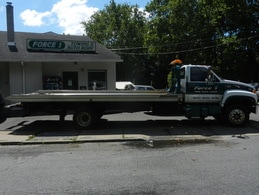Ready for reliable and friendly service in a towing company? Combined with competitive rates? Call Force 1 Towing and Auto Body in Catasauqua at 610-266-6721
Governor Lamont Urges Lawmakers To Support Continued Decarbonization of Electric Grid by Codifying 2040 Zero-carbon Target
(HARTFORD, CT) – Governor Ned Lamont is urging the Connecticut General Assembly to approve legislation he introduced (Senate Bill 10, An Act Concerning Climate Change Mitigation) that will codify into state statutes the 2040 zero-carbon electric grid goal the governor established in 2019 when he issued Executive Order No. 3 and was also included as a recommendation by the Connecticut Department of Energy and Environmental Protection in its 2020 Integrated Resources Plan.
The proposal is the subject of a public hearing being held today by the Energy and Technology Committee.
The governor explained that codifying this into statute is necessary to provide state policymakers and the electricity sector with a shared goal of fully transitioning the state away from relying on natural gas and oil to power its electric grid. While Connecticut has already made significant progress in decarbonizing its grid, he said the state must accelerate that progress to do its part in mitigating climate change.
“We’ve already made great progress in decarbonizing our grid, but we need to make sure we get the rest of the way there,” Governor Lamont said. “Codifying the 2040 zero-carbon electric grid target will provide critical direction to the Department of Energy and Environmental Protection, the Public Utilities Regulatory Authority, the electric utilities, the municipal utilities, and others in planning and implementing energy policy. Many of our peer states have adopted their own zero-carbon goals, including our neighbors in Rhode Island by 2030 and New York by 2040. Let’s get this done for the sake of doing our part to mitigate climate change, improve our air, and support clean energy jobs across Connecticut.”
Documents:
“We must continue to take meaningful action to decarbonize our economy and reduce greenhouse gas emissions in order to mitigate the impacts of the climate crisis that we are already starting to experience,” Department of Energy and Environmental Protection Commissioner Katie Dykes said. “The good news is that we are on a good trajectory to meet this target, and there are multiple ways to get there, as our 2020 Integrated Resources Plan demonstrated. Codifying this target will help us to meet our greenhouse gas emissions reduction goals for 2030 and 2050 already codified in our state statutes, and will provide us with much needed flexibility should decarbonizing other sectors prove more challenging.”
Several advocates representing environmental organizations are also encouraging the passage of Senate Bill 10.
“Acadia Center applauds Governor Lamont for pushing this statutory target for a zero carbon electric grid by 2040,” Amy McLean, Connecticut director and senior policy advocate for Acadia Center, said. “This legislation will complement the broader economy-wide decarbonization goals laid out in the Global Warming Solutions Act. By passing Senate Bill 10, the state will ensure that the zero-carbon goal has the force of law necessary to drive the changes in the state’s electric sector that are imperative to reach the 2040 goal and beyond.”
“Connecticut’s landmark Global Warming Solutions Act requires the state to significantly reduce its greenhouse gas emissions,” Charles Rothenberger, climate and energy attorney for Save the Sound, said. “Unfortunately, we know from the most recent Connecticut greenhouse gas inventory that the state is not currently on track to meet those mandatory reductions. Codifying the 100% zero-carbon electricity standard is a critical step towards eliminating our reliance on fossil fuels and achieving our climate goals.”
“Electrifying our economy across all sectors is a necessity in addressing climate change,” Nathan Frohling, director of external affairs for The Nature Conservancy in Connecticut, said. “Commitment to a 100% zero-carbon electricity supply in Connecticut by 2040 is both doable and a critical step. We appreciate Governor Lamont’s leadership in moving this legislation forward and call on the state legislature and all those concerned with climate change to support it.”
Read on CT.gov
The proposal is the subject of a public hearing being held today by the Energy and Technology Committee.
The governor explained that codifying this into statute is necessary to provide state policymakers and the electricity sector with a shared goal of fully transitioning the state away from relying on natural gas and oil to power its electric grid. While Connecticut has already made significant progress in decarbonizing its grid, he said the state must accelerate that progress to do its part in mitigating climate change.
“We’ve already made great progress in decarbonizing our grid, but we need to make sure we get the rest of the way there,” Governor Lamont said. “Codifying the 2040 zero-carbon electric grid target will provide critical direction to the Department of Energy and Environmental Protection, the Public Utilities Regulatory Authority, the electric utilities, the municipal utilities, and others in planning and implementing energy policy. Many of our peer states have adopted their own zero-carbon goals, including our neighbors in Rhode Island by 2030 and New York by 2040. Let’s get this done for the sake of doing our part to mitigate climate change, improve our air, and support clean energy jobs across Connecticut.”
Documents:
- Senate Bill 10, An Act Concerning Climate Change Mitigation
- Fact sheet on Senate Bill 10
- Department of Energy and Environmental Protection’s 2020 Integrated Resources Plan
“We must continue to take meaningful action to decarbonize our economy and reduce greenhouse gas emissions in order to mitigate the impacts of the climate crisis that we are already starting to experience,” Department of Energy and Environmental Protection Commissioner Katie Dykes said. “The good news is that we are on a good trajectory to meet this target, and there are multiple ways to get there, as our 2020 Integrated Resources Plan demonstrated. Codifying this target will help us to meet our greenhouse gas emissions reduction goals for 2030 and 2050 already codified in our state statutes, and will provide us with much needed flexibility should decarbonizing other sectors prove more challenging.”
Several advocates representing environmental organizations are also encouraging the passage of Senate Bill 10.
“Acadia Center applauds Governor Lamont for pushing this statutory target for a zero carbon electric grid by 2040,” Amy McLean, Connecticut director and senior policy advocate for Acadia Center, said. “This legislation will complement the broader economy-wide decarbonization goals laid out in the Global Warming Solutions Act. By passing Senate Bill 10, the state will ensure that the zero-carbon goal has the force of law necessary to drive the changes in the state’s electric sector that are imperative to reach the 2040 goal and beyond.”
“Connecticut’s landmark Global Warming Solutions Act requires the state to significantly reduce its greenhouse gas emissions,” Charles Rothenberger, climate and energy attorney for Save the Sound, said. “Unfortunately, we know from the most recent Connecticut greenhouse gas inventory that the state is not currently on track to meet those mandatory reductions. Codifying the 100% zero-carbon electricity standard is a critical step towards eliminating our reliance on fossil fuels and achieving our climate goals.”
“Electrifying our economy across all sectors is a necessity in addressing climate change,” Nathan Frohling, director of external affairs for The Nature Conservancy in Connecticut, said. “Commitment to a 100% zero-carbon electricity supply in Connecticut by 2040 is both doable and a critical step. We appreciate Governor Lamont’s leadership in moving this legislation forward and call on the state legislature and all those concerned with climate change to support it.”
Read on CT.gov



